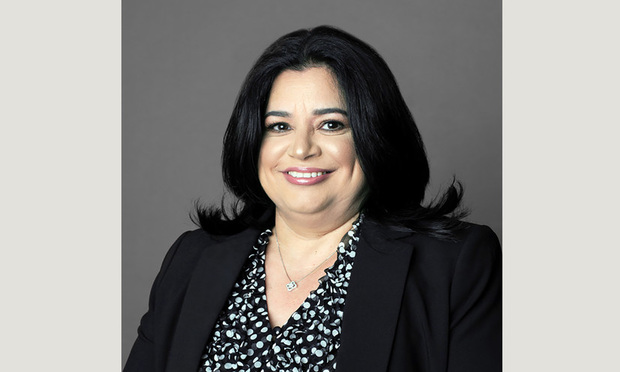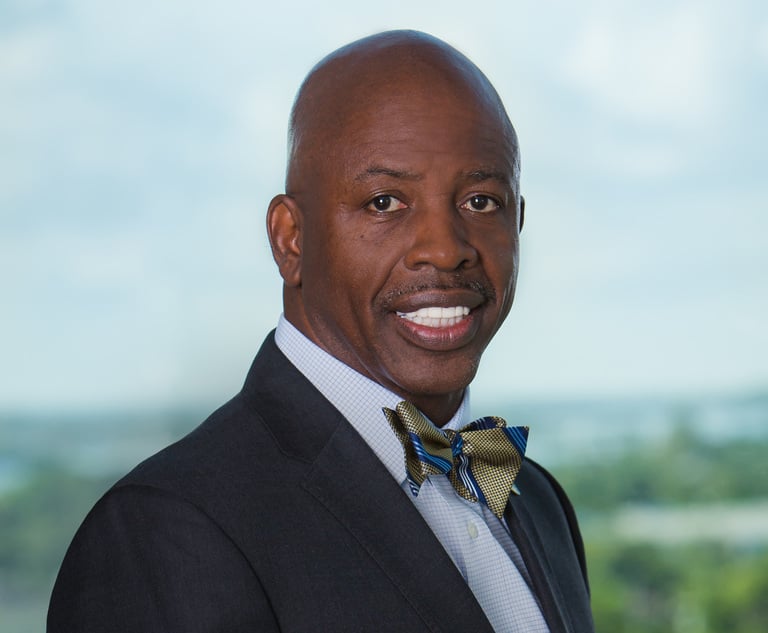Greenspoon Marder Appoints a Chief Diversity Officer
Myrna Maysonet joins a slate of firms who have appointed chief diversity officers.
March 20, 2019 at 06:36 PM
5 minute read
 Greenspoon chief diversity officer Myrna Maysonet.
Greenspoon chief diversity officer Myrna Maysonet.Greenspoon Marder has appointed labor and employment partner Myrna Maysonet to serve as the firm's chief diversity officer, joining a growing list of law firms and Fortune 500 companies with similar C-suite positions.
Maysonet, who was appointed to the post earlier this month, will oversee the firm's diversity initiatives and work to attract diverse candidates while still maintaining her practice. She will work closely with the firm's chief marketing officer, Michelle Martinez Reyes, and her staff, and will report directly to co-founders Gerald Greenspoon and Michael Marder.
Put plainly, Maysonet said, “my job is to attract diverse people.”
Maysonet has been with Greenspoon Marder since 2000, rising in the ranks as the firm expanded rapidly over the next decade. She is the firm's first woman partner and is openly gay. Her first brush with inclusion in law came in 2004, when she convinced Marder to allow domestic partners to receive health insurance.
“When I got this job, Michael joked that I had been doing this for 10 years,” she said.
Her first priority is to take stock of how much progress the firm has already made in an attempt to identify current issues and organize what the firm is already doing. Before she assumed the new position, there had been no real firmwide effort regarding diversity, she said, although there are regional programs, such as the Greenspoon Marder's partnership with the National Diversity Council. Former Greenspoon partner Evett Simmons had previously held the title of chief diversity officer, though the firm says the two positions are alike in name only.
That effort includes visiting each of Greenspoon Marder's 25 offices, re-circulating a diversity survey, partnering with historically black colleges to establish a pipeline and forming a committee for attorneys to provide input and help create strategies.
Maysonet said diversity needs to go further than ”checking the box.” Law firms need to look not just at representation, but access and power.
“If they don't have a seat at the table then who cares?” Maysonet said. “What are my underrepresented communities? How are they growing? Are they given opportunities? Do they have executive power?”
As it stands now, 37 percent of the firm's employees identify as a racial or ethnic minority, according to Martinez Reyes. Women comprise 33 percent of the firm's attorneys and Greenspoon Marder's management committee is nearly 30 percent women. Out of the firm's 111 partners in 2018, 99 are Caucasian, eight are Hispanic, two are multi-racial and two are Asian, according to numbers submitted to ALM.
Much of the diversity push is being driven by clients: In January, general counsel from more than 170 companies—including Etsy, Lyft, Booz Allen Hamilton and Vox Media—published an open letter admonishing the lack of diversity in the legal profession. In the letter, the companies said they would prioritize their legal spending on firms that commit to diversity and inclusion.
Maysonet said that she's had clients ask her for Greenspoon Marder's diversity or religious tolerance policies.
“People want to make sure they're doing business with a company that has values,” she said.
Several large multinational companies such as Uber, General Electric and Ebay have made the chief diversity officer position a part of their C-suite. According to a report by the Wall Street Journal, 60 percent of Fortune 500 companies had a chief diversity officer in 2012.
And law firms, which frequently lag behind their big-business counterparts, are starting to catch up. Several firms now have a chief diversity officer, including Blank Rome, Fisher & Phillips, Shearman & Sterling and Pillsbury Winthrop Shaw Pittman.
Michelle Silverthorn, founder and CEO of Inclusion Nation, said that it's important to not just appoint a chief diversity officer but to empower whoever is in the position.
“The [chief diversity officer] really needs the flexibility to dive in, bring in consultants, do the speeches, the keynotes,” said Silverthorn, a former Schiff Hardin associate. “I think the most important thing is: Who do they report to? What resources do they have? What access to data do they have?”
Silverthorn said it's also important that whoever is coming in as chief diversity officer has to understand the legal profession. Understanding the culture, she said, especially given the legal profession's traditionalist-streak, is important to understanding how to get attorneys on board with changes to the firm's overall culture.
“It's so important to look at the culture to ask what part of the culture exists for your attorneys and clients, and what part of your culture is just there because it exists?”
Related Stories:
Korean-American Ex-Shareholder Lodges Bias Suit Against Greenspoon Marder
The NLJ 500: Career-Nurturing Firms Win High Rankings on Women-in-Law Scorecard
170 GCs Pen Open Letter to Law Firms: Improve on Diversity or Lose Our Business
This content has been archived. It is available through our partners, LexisNexis® and Bloomberg Law.
To view this content, please continue to their sites.
Not a Lexis Subscriber?
Subscribe Now
Not a Bloomberg Law Subscriber?
Subscribe Now
NOT FOR REPRINT
© 2025 ALM Global, LLC, All Rights Reserved. Request academic re-use from www.copyright.com. All other uses, submit a request to asset-and-logo-licensing@alm.com. For more information visit Asset & Logo Licensing.
You Might Like
View All
Essential Labor Shifts: Navigating Noncompetes, Workplace Politics and the AI Revolution

Adapting to AI and the Needs of Lawyers Will Be Key For Shutts & Bowen, Says Incoming Ft. Lauderdale Leader
8 minute read

Trending Stories
- 1'It's Not Going to Be Pretty': PayPal, Capital One Face Novel Class Actions Over 'Poaching' Commissions Owed Influencers
- 211th Circuit Rejects Trump's Emergency Request as DOJ Prepares to Release Special Counsel's Final Report
- 3Supreme Court Takes Up Challenge to ACA Task Force
- 4'Tragedy of Unspeakable Proportions:' Could Edison, DWP, Face Lawsuits Over LA Wildfires?
- 5Meta Pulls Plug on DEI Programs
Who Got The Work
Michael G. Bongiorno, Andrew Scott Dulberg and Elizabeth E. Driscoll from Wilmer Cutler Pickering Hale and Dorr have stepped in to represent Symbotic Inc., an A.I.-enabled technology platform that focuses on increasing supply chain efficiency, and other defendants in a pending shareholder derivative lawsuit. The case, filed Oct. 2 in Massachusetts District Court by the Brown Law Firm on behalf of Stephen Austen, accuses certain officers and directors of misleading investors in regard to Symbotic's potential for margin growth by failing to disclose that the company was not equipped to timely deploy its systems or manage expenses through project delays. The case, assigned to U.S. District Judge Nathaniel M. Gorton, is 1:24-cv-12522, Austen v. Cohen et al.
Who Got The Work
Edmund Polubinski and Marie Killmond of Davis Polk & Wardwell have entered appearances for data platform software development company MongoDB and other defendants in a pending shareholder derivative lawsuit. The action, filed Oct. 7 in New York Southern District Court by the Brown Law Firm, accuses the company's directors and/or officers of falsely expressing confidence in the company’s restructuring of its sales incentive plan and downplaying the severity of decreases in its upfront commitments. The case is 1:24-cv-07594, Roy v. Ittycheria et al.
Who Got The Work
Amy O. Bruchs and Kurt F. Ellison of Michael Best & Friedrich have entered appearances for Epic Systems Corp. in a pending employment discrimination lawsuit. The suit was filed Sept. 7 in Wisconsin Western District Court by Levine Eisberner LLC and Siri & Glimstad on behalf of a project manager who claims that he was wrongfully terminated after applying for a religious exemption to the defendant's COVID-19 vaccine mandate. The case, assigned to U.S. Magistrate Judge Anita Marie Boor, is 3:24-cv-00630, Secker, Nathan v. Epic Systems Corporation.
Who Got The Work
David X. Sullivan, Thomas J. Finn and Gregory A. Hall from McCarter & English have entered appearances for Sunrun Installation Services in a pending civil rights lawsuit. The complaint was filed Sept. 4 in Connecticut District Court by attorney Robert M. Berke on behalf of former employee George Edward Steins, who was arrested and charged with employing an unregistered home improvement salesperson. The complaint alleges that had Sunrun informed the Connecticut Department of Consumer Protection that the plaintiff's employment had ended in 2017 and that he no longer held Sunrun's home improvement contractor license, he would not have been hit with charges, which were dismissed in May 2024. The case, assigned to U.S. District Judge Jeffrey A. Meyer, is 3:24-cv-01423, Steins v. Sunrun, Inc. et al.
Who Got The Work
Greenberg Traurig shareholder Joshua L. Raskin has entered an appearance for boohoo.com UK Ltd. in a pending patent infringement lawsuit. The suit, filed Sept. 3 in Texas Eastern District Court by Rozier Hardt McDonough on behalf of Alto Dynamics, asserts five patents related to an online shopping platform. The case, assigned to U.S. District Judge Rodney Gilstrap, is 2:24-cv-00719, Alto Dynamics, LLC v. boohoo.com UK Limited.
Featured Firms
Law Offices of Gary Martin Hays & Associates, P.C.
(470) 294-1674
Law Offices of Mark E. Salomone
(857) 444-6468
Smith & Hassler
(713) 739-1250






